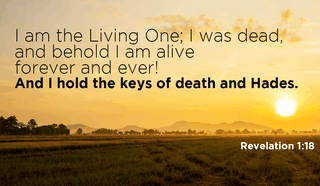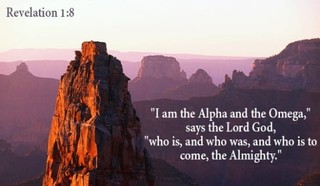- Recent Translations
- All Translations
Apocalypse 1:18
Share
Settings
Apocalypse 1:18 Meaning and Commentary
I [am] he that liveth
As the eternal God, who has life in himself, originally, essentially, and inderivatively, and is the fountain and author of life to others; and who ever lived as the Mediator and Redeemer, and still does, and ever will, yea, even when he was dead as man:
and was dead;
he died the death of the cross, for the sins of his people, in due time, and but once; and it was but a short time he was held under the power of death, and will never die any more:
and behold I am alive for evermore, Amen;
he was always alive as God, or he was always the living God, and ever will be; and he is now alive as man, and will for ever continue so; and he is alive to God, he lives by him, with him, and to his glory; and he is alive to the benefit and advantage of his redeemed ones, for whom he died; he ever lives to make intercession for them; he rose again from the dead for their justification; their being quickened together with him, and their being begotten again to a lively hope, are owing to his being alive; and as their reconciliation is by his death, so their salvation, or the application of it to them, is by his interceding life; and his resurrection is the cause of theirs: this is very fitly said to John, who was fallen as dead at the feet of Christ, and might be to animate him against the fears of death, or whatever he was to meet with on account of Christ; as well as to make himself known unto him, who had before known him, living, dying, and risen again. The word "Amen" is left out in the Alexandrian copy, the Vulgate Latin, Syriac, and Ethiopic versions; but is in others, and is rightly retained, either as an asseveration of Christ to the truth of what is before said, or as an assent of John's unto it, who was a proper witness both of the death and resurrection of Christ:
and have the keys of hell and death;
or "of death and hell"; as the words are transposed in the Alexandrian copy and Complutensian edition, in the Vulgate Latin and in all the Oriental versions, agreeably to ( Revelation 6:8 ) ( Revelation 20:13 Revelation 20:14 ) , by which phrase is expressed the power of Christ over both: his power over death is seen in taking away persons by death when he pleases, the instances of Ananias and Sapphira are proofs of this; and in delivering persons from death when near it, as the centurion's servant, Peter's wife's mother, and the nobleman's son of Capernaum; and in raising persons from the dead, as Jairus's daughter, the widow of Naam's son, and Lazarus, when he was here on earth; and in his raising up his own body when dead, and which will also appear in raising all the dead at the last day: and his power over "hell", by which may be meant the grave, or the place of the departed, and separate souls, or the place of the damned and of the devils which are there, will be seen in opening the graves at the time of the resurrection, when death and hell, or the grave, will deliver up the dead in them, at his command; and in retaining or sending out the separate souls "in hades"; and in opening the doors of hell, and casting in the wicked, and destroying them, soul and body, there; and in shutting them up, that they cannot come out from thence who are once in; and in binding Satan, and casting him into the bottomless pit, and shutting him up there, the key of which he has in his hand; and in preserving his church and people from his power and malice, so that the gates of hell cannot prevail against them. This is an expression of the sovereignty, power, and authority of Christ; and is designed to encourage and support John under his present concern and anxiety of mind about the person he saw in this vision: (hrwbq lv xtpm) , "the key of the grave", and of the resurrection of the dead, is frequently said by the Jews to be one of the keys which are in the hands of the holy blessed God, and his only; not in the hands of an angel or a seraph, or any other F21.
F21 Bereshit Rabba, sect. 73. fol. 64. 3. Targum Jerus. in Gen. xxx. 21. & Jon in Deut. xxviii. 12. Zohar in Gen. fol. 67. 3. Pirke Eliezer, c. 34. T. Bab. Taanith, fol. 2. 1. & Sandedrin, fol. 113. 1.


